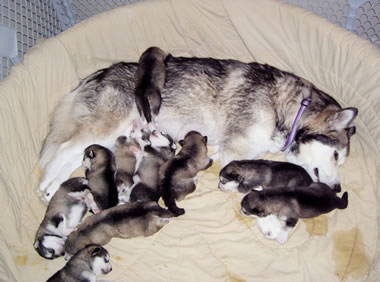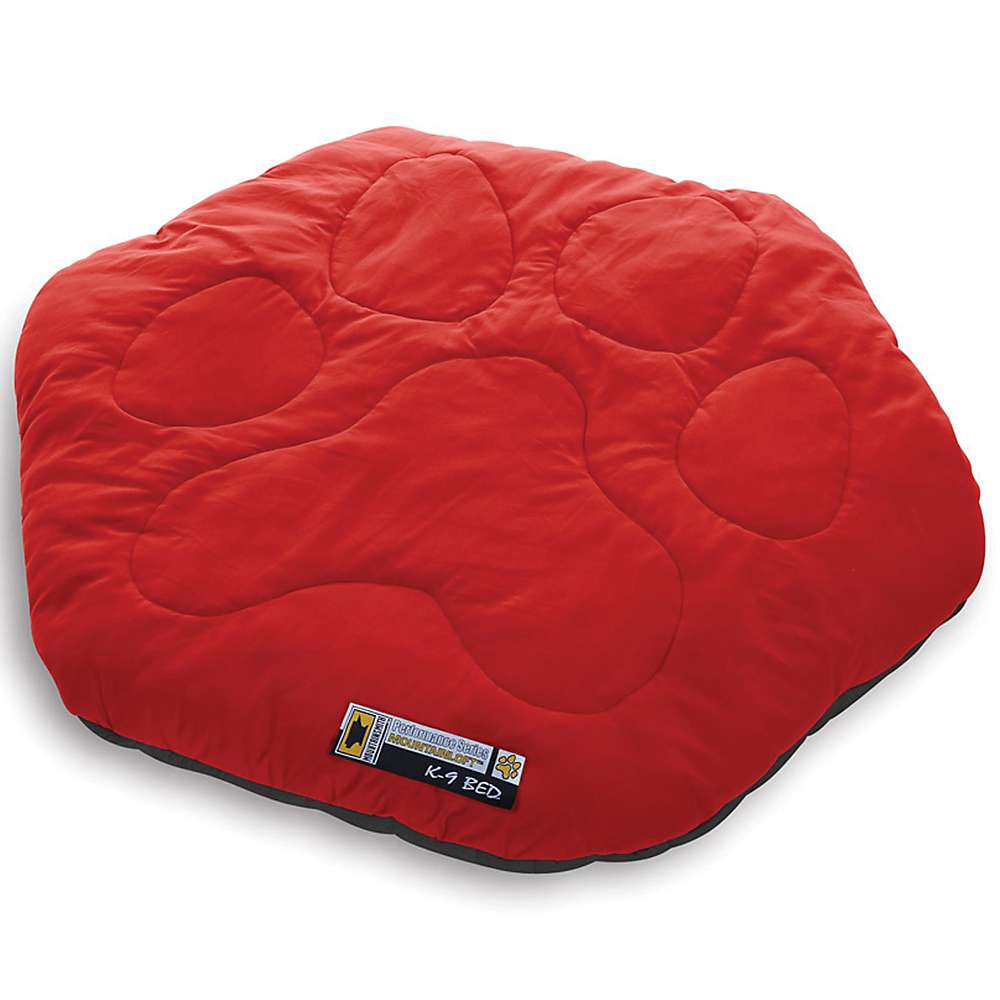Should I Breed My Female? 
You do realize ANY time you breed your girl you are risking her life...granted, with vet care that it is today you have someone to turn to (hopefully) if things go wrong, but the risk is always there (plus, after what's happened to us, I don't have too high an opinion of your average "pet" vet - if you do it, PLEASE find a good reproduction specialist vet just in case you need it ahead of time!). Also, keeping your bitch intact increases her risk of developing pyometra -- a heartbreaking and horrible infection only intact bitches can get.
Before any reputable breeder will let you use their male, you will have to have your bitch OFA, CERF and CHD certified (hips, eyes and dwarfism) - and you will probably have to do a brucellosis test, and quite possibly, if her seasons are not regular or you don't have a stud on your premises to tell you "when" - progesterone testing (which must be done every other day until she ovulates - that can be 5 or more visits to the vet at $30+ a visit here in the midwest - more elsewhere).
No stud owner is going to want to board your bitch for two weeks (at your expense) driving her male bonkers until she's "ready" so you will need to time it as closely as possible which means several progesterone tests at $50 a pop!
Then there is the stud fee...depending on who you decide to go to it can be a little or allot. If you pay a little or just use the dog next door - don't expect to get much for the puppies - but you'll still be expected to guarantee them for every health problem under the sun regardless so yo better know what's back there.
If you pay allot, you can ask more for the puppies but often there are "conditions" such as a puppy goes to the stud owner for free BESIDES the stud fee! (and is this someone you'd really want to give one of your beloved puppies? I guarantee by 8 weeks you will be in love with them all and won't want to give one to your MOTHER - so think carefully - maybe ...maybe not).
The typical cost of a stud fee is about the price of a pet or show puppy - depending on the stud owner - and most stud owners will guarantee you get at least a puppy or two or will give a repeat service. Of course, before you even breed her, you better have some good homes lined up. (and get a deposit - because all those people that told you they wanted one will disappear as soon as they are born!) As you talk to people you will discover most homes are really unprepared for a Malamute! You will spend tons of time talking to unsuitable homes, and educating the educatable ones, and maybe 1 out of 10 would be suitable for your puppies if you're lucky and not too picky.
Statistics have shown that almost 60% of Malamute puppies are rehomed within the first 2 years - often without the breeder's knowledge. If you counted everyone out there breeding - the stats would be MUCH higher. If a typical breeder is careful it can be as low as 20% (or 1 puppy per litter average litter). We've been quite lucky and have about a 10% return rate which is excellent.
Raising a Litter...Hi Ho, Hi Ho, Off to the Poorhouse we go...(feel free to whistle along)
Lets say you've found the perfect stud dog - reasonable stud fee, and he's a champion and a nice one at that. The stud fee is only the beginning. You will pay MUCH more than that to whelp and raise the puppies even if everything goes smoothly (and if she needs a c-section because something goes wrong you can end up with 1 or 2 puppies and thousands in vet bills to show for the litter).
Ok, you luck out and everything goes smoothly - you now have about 5 nice puppies (a typical sized Malamute litter). Make a place for yourself to sleep by the whelping box for about a week to make sure everything goes well - Mom can easily step on or neglect a puppy. If a puppy gets chilled it will die. If it doesn't suck well it will die. If Mom steps on it or is a bad Mom, they may all die. Mom won't be able to be left alone for any length of time so plan to use your two weeks of vacation now.
If there are complications - sick puppies, the need to be bottle fed, or stimulated to poop (they can't do it on their own for several days) you may need to take longer off of work. Hopefully your boss will be sympathetic to this. And there's nothing like holding a newborn puppy under warm running water at 3 am because he won't poop and is crying. At about 3 weeks they begin eating solid food and will need to be fed a high quality food several times a day.
A litter of puppies will go through about a 40 lb. bag in approximately a week once they begin eating solid food and are weaned. Until they are weaned, you feed the Mom the 40 lb. bag of food every week so she can make milk - along with eggs, cottage cheese, hamburger and vitamins. She SHOULD eat better than you - she's feeding a half dozen babies.
Some Moms will wean on their own, others need to be encouraged with creative "clothing" to prevent the puppies from nursing. Plan on coming home at lunchtime to feed puppies and clean up poop. LOTS of poop. More poop than you can imagine right now!
This is about the time Mom says enough and stops cleaning up after them so it will become your job. Once they can walk and track it all over the floor you will need to mop a couple of times a day with bleach or another disinfectant. If you are fortunate they won't contract coccidia or any other kinds of illnesses that require an extra vet visit. Our vet charges per puppy for a well- puppy check up though I've heard some will charge by the litter - that's a lucky breeder!
During this time you will probably be interviewing prospective homes and allowing them into your home to play with the puppies and advertising for the homes you need in the newspaper and elsewhere. At 6 weeks it's a vet appointment for the first round of shots and again at 8 weeks before they go to their new homes - then there are the optional expenses such as tattoos or micro chipping, collars and leashes, toys and extra food to send home with the new owner.
Finally, at 8-9 weeks they are ready to go to their new homes. If you're lucky they haven't torn the wallpaper off the walls or chewed on the phone cord by then (though they always get SOMETHING). Congratulations, you've made it through the easy part!
Then comes the hard part. The hardest part of all is crying for two weeks after they leave because you worry if you chosen the homes well! Also, statistics show even with carefully-placed puppies from breeders that will take them back wihtout question - there is a 20% return rate - so out of those 5 or 6 expect one or even two homes to change their mind about the puppy in the coming weeks and return it to you (it IS your responsibility to take it back - no one else's!) - and the home that underfed and screwed up your puppy will be expecting a full refund of course!
It's your choice whether to give it or not but a 15 week old puppy is not easy to place - and is worth less than half of what a young 8 week old puppy is worth - so you may have him awhile. I hope you have the space for this since your own dogs may not be too thrilled with his return.
What are the options?
Spaying before she has any pups at all gives her lifelong protection against all kinds of uterine and mammary cancers - so why do you feel you need to breed her? All it's going to do is set you back a few thousand dollars, risk her life, and keep you up nights worrying even if all goes well. Health has become a major issue in Malamutes. A few sloppy breeders have changed things forever - spreading their problems across the country.
Malamutes are having terrible problems with things like coat funk (all their hair falls out), polyneuropathy (a crippling neurological disease), cataracts (blindness) and of course thyroid and epilepsy which apparently are VERY common. It's a minefield out there. Not knowing what you might be doubling up on can be scary - you could luck out and have the healthiest pups out there - or a whole litter of problems. Could you put them down if they have serious problems but "look" ok?
That also doesn't address even if you have homes for them all, a responsible breeder is responsible for what they breed for the lifetime of the dogs. If someone had to give one of the pups back - even years later - do you have somewhere you could house the dog until you found another home for it?
These are all things to think about - especially when you would be endangering your bitch for $50 puppies. There are a lot of SHOW breeders out there that shouldn't be breeding either, so I'm not saying this just because your beautiful Stud and Lovely Bitch aren't registered or you don't show them. Actually, I would rather have a healthy, well socialized puppy from a backyard breeder that did all the health checks (like you've done - right?) than certain show breeders...but if you really love your pet, you need to find out what is behind her before you do ANYTHING.
Do you have any kind of a pedigree at all? If you do, maybe a seasoned breeder you can trust will take a look to see if anything looks familiar...if you don't have one, personally, I don't know if I'd risk it with all the stuff turning up out there.
So You Think You have a Stud dog...
Should I breed my male? Welllllllllllll breeding, unless you want to take the trouble to enter (possibly hundreds) of AKC shows in the hopes of a title, and ESPECIALLY do the health checks (OFA, CERF, CHD - a necessity) you shouldn't breed him - NOT what you wanted to hear, was it?
Do you have a pedigree on this guy? I bet he looks very nice. But, unless you've done all that, the most you could probably get for a stud fee would be a $100 or so which is really not worth your time when you figure you may have to board the bitch for 2 weeks (picking her up at airports if necessary - the bitch customarily goes to the dog), oversee a several breedings (and a new stud dog will take several tries before he gets it "right" and it will take at least 2 people - one to hold each dog so the male doesn't get hurt - he has a tiny bone that can get broken and ruin him forever if you don't) and THEN hope for puppies so you'll get paid.
No puppies, no fee -- or only 1/2 fee (with the guarantee you'll do this all over again for free or the other $50 if there is less than say 2 or 3 puppies). (oh yes, forgot about the fact you have to get a brucelloisis test on your male, sperm mobility tests, and health check before anyone would consider using him and even before you get any money ...bye bye $100)
Then, say the bitch owner sells the puppies and the people she sells them to can't keep them (at any age - even old), and she won't take them back, YOU will have to. Is that worth $100? Not really. Some of the top studs in the country only get $400 and they only do it because they love the breed and want to see it continue. There are only 1 or 2 that get more money than that - I know of one that got $1000 but he was #1 AKC champion dog in the country for several years and his owner probably spent $100,000 campaigning him at dog shows to get that occasional $1,000 stud fee. And no one wants to breed to an unproven, non-champion male when they can get a top dog for a little more (and brag about it and sell the puppies for MUCH more).
It is a serious problem in this breed as everyone is using the same studs and spreading the same genetic problems around so if he IS nice, and clears all the health checks and has a good pedigree, it would be good to breed him to a nice bitch...but you really have to be commited (or maybe commited to an institution !) to want to do this!
Unless you have someone in mind that is a friend and you want a puppy out of her bitch, and they compliment each other well (she offsets his faults and visa versa), and you know the pedigrees on both and the genetic problems they are likely to throw together (like coat funk, cataracts, epilepsy, polyneuropathy, thyroid, heart problems, liver problems, etc.), and you've shown the dog and gotten some positive feedback (in other words you've won a lot), and most importantly, the bitch owner has deposits for puppies all lined up ahead of time -- don't bother. It's just not worth it.
That's why we've never used our dogs at stud to anyone but our own girls. It's just not worth the aggravation! If you have a good dog you think has potential, you need to contact an experienced breeder and have him evaluated - his structure, his pedigree and his movement (very important in a stud dog)! A seasoned breeder will tell you when you're wasting your time - perhaps he doesn't have much "bone" - and is a sort of "old style" Malamute (which I like, but nobody wants these days - they want legs like pillars ;-) - it's good to know before you blow a lot of money on dog shows and advertising. Then you start showing him - and if everyone encourages you to continue - stop. Yes, stop. You are just fodder for the big winners so they can get points.
On the other hand....if everyone tells you the dog is junk, makes disparaging remarks outside the ring, and tries to trip you IN the ring...maybe you have something there! They don't want the competition so maybe you SHOULD show and breed him!
Anyway, probably more info than you wanted ;-p....but I know nobody ever explained all of this when we got started and you need to know how in debt you'll be, showing and breeding dogs. You certainly don't MAKE any money at it, actually you tend to go to the poorhouse. (BTW, the lady with the $1,000 stud fee lives in a little bitty house in the inner city - maybe 650 sq. ft house on a city lot ...so you know she is just raking in the cash to put toward her mansion).
Books on Dog Structure















